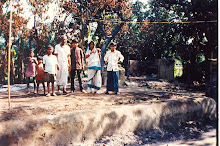Viewpoint:
Need a Long Term anti-Fundamentalist Policy
Sachi G. Dastidar
For some time, American and Western record against extremism has been inconsistent, especially against Islamic fundamentalism. 9/11 has changed all that. During Cold War we have supported many anti-secular, anti-democratic, pro-fundamentalist regimes contradicting our publicly-stated policy. Recently in order to win Cold War we supported Taliban against a secular Afghanistan, albeit then pro-Soviet. Taliban monstrosity made women non-person and drove her indigenous Hindu, Sikh, Buddhist minorities away. Taliban destruction of ancient Bamiyan Buddhas were well reported, but not the destruction of scores of Hindu-Sikh temples. Now the liberated nation has approved an ‘Islamic Constitution!’ Our anti-Cold War vigor overthrew a secular regime in Iran giving birth to an authoritarian Shah, which led to myopic Islamists. We have supported intolerant, Islamic dictatorships and ethnic cleansing of non-Muslims in Pakistan against a pluralistic India. In 1971 Nixon Administration opposed the first-ever independence movement in a Muslim-majority nation for a secular constitution: Bangladesh. Pakistan’s Islamic dictator embarked on genocide of its Hindu minority and secular Muslims. Army of the Islamic Republic of Pakistan and its Bengali Islamist allies killed 3 million mostly-Hindus in 9 months, yet no one was punished at Saudi, Islamic, Chinese and Western pressure. We did not have normal relation with the new nation until the pro-secular president was murdered in 1975 along with his extended family, including a 3-year old grandson. Saudi Arabia and Pakistan recognized the new regime within hours of that killing, and provided heaven for those killers. Those and many other Islamist nations provided shelters of the mass murderers of 1971 genocide. Surprisingly many of those killers found shelter in the U.S. as well. Now Bangladesh is ruled by Islamists, including pro-Taliban parties. They are brazenly attacking minority Hindus, Buddhists and Christians and pro-secular Muslims. In June 2004 they attacked a rally targeting the pro-tolerant former Prime Minister killing 22. In October 2001 pro-Islam parties came to power on the backs of Islamic pride after 9/11 and by systematically attacking and disenfranchising Hindu minorities.
Our public policy of supporting fundamentalist, dictatorial, anti-democratic regimes has been contrary to our pro-tolerant, secular, democratic pluralism that Americans believe in. Rest of the world finds the contradiction of popular belief and public policy with surprise, unease and disbelief. We have been protecting an intolerant, anti-women, anti-non Muslim, jihad-producing anti-democratic regime in Saudi Arabia with which we have nothing in common. After the first Gulf War we gave a liberated Kuwait an Islamic theocracy instead of a secular, constitutional monarchy like Japan and parts of Europe after WWII. Kuwait still restricts its overwhelming majority any form of political participation. Almost all the extremist Islamic madrassa schools in fur-flung nations from Indonesia to India, Pakistan to Philippines, Bangladesh to Nigeria, and from Sudan to Sri Lanka are funded by our ‘friends’ — Saudi and other intolerant Islamists. Before 9/11 we ignored the Saudi-funded extremism as it affected Asia and Africa, not us. Sadly though only two of 50-plus Muslim-majority nations have had secular constitution but enforced though military: Turkey of Kemal Ataturk and dictator Saddam’s Iraq. For tens of millions of victims of Islamic ethnic cleansing like us the post-liberation Iraq’s rise of Islamic extremism is quite disturbing. Liberation from a mad dictator must not end up with even more merciless intolerant society. A large number of Christians who lived under Saddam have already fled the country as attack on churches increased after liberation.
During the unchallenged days of Rule Britannica, the imperial power used divide-and-rule policy to create divisions among groups. Ironically one of their first experiments to divide a people was Islamism in India in 1905 when they partitioned a homogeneous Bengal Province into ‘Muslim Bengal’ and ‘Hindu Bengal,’ where that chasm didn’t exist. Within four decades of that short-term opportunism two intolerant Islamist territories would rise: Pakistan, West (now Pakistan) and East (now Bangladesh.) Colonial rulers planted political Islam in order to divert Indian independence movement involving peoples with multitude of languages and religion. Such colonial divisiveness continued from Ireland to Cyprus, Nigeria to Sudan, Iraq to Fiji, and from Palestine to Ceylon (Sri Lanka.) All those regions are still suffering devastating consequences from that policy adopted for colonial rule. However, Imperial Britain ruled her colonies with long-term objective as if they would be there for ever. Thus even after decolonization she retains significant influence over her former colonies. To win over extremism, including intolerant Islamism, we must devise a long term policy aligned with our national ideals and support local progressives to create tolerant, secular, pluralistic societies.
December 2004
Written for a US Journal

No comments:
Post a Comment